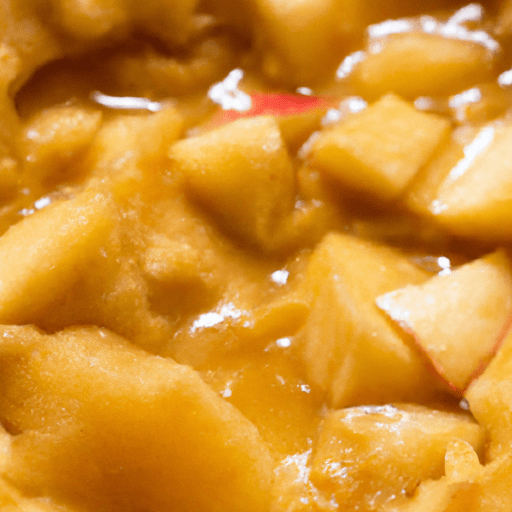The Delicious World of Apple Pie Filling
Nothing says comfort like a warm slice of apple pie. And at the very heart of this classic dessert is the scrumptious apple pie filling. Bursting with the flavors of tart apples, warm spices, and a touch of sweetness, apple pie filling is a versatile and irresistible concoction that has made its way into countless kitchens and bakeries around the world.
The Taste of Apple Pie Filling
Apple pie filling offers a delightful combination of flavors. The tangy, crisp apples create a perfect balance when cooked with sugar, cinnamon, and a hint of lemon juice. The spices provide warmth and depth, enhancing the natural sweetness of the apples. The result is a filling that is rich, flavorful, and comforting.
Common Uses in Cooking
Beyond being the star ingredient in the beloved apple pie, apple pie filling can be utilized in various culinary creations. Consider using it to:
- Fill turnovers or hand pies for a portable treat on the go.
- Top pancakes or waffles to transform a breakfast staple into a delicious indulgence.
- Swirl it into homemade ice cream or churn it into a decadent apple pie filling-flavored frozen dessert.
- Flavor your oatmeal or yogurt for a satisfying, fruity twist.
- Incorporate it into a crumble or cobbler for a quick and easy dessert.
The possibilities are countless, limited only by your imagination!
Nutritional Value
While apple pie filling is undeniably tempting, it’s essential to consider its nutritional value. By using fresh apples and controlling the amount of sugar added, you can create a filling that is not only delicious but also moderately healthy. Apples contain fiber, vitamin C, and antioxidants, making them a nutritious choice. However, it’s important to consume apple pie filling in moderation due to the added sugars present.
A Slice of History
Apple pie has long been an iconic American dessert. Its origins, however, are rooted in Europe, where apples were commonly grown. The first recorded recipe for apple pie dates back to 1381 in England. As European settlers arrived in America, they brought this beloved dessert recipe with them. From there, apple pie quickly became an integral part of American cuisine. In fact, the phrase “as American as apple pie” was coined to symbolize all that is comforting and quintessentially American.
Interesting Facts
- Apple pie filling is not limited to just apples; it can also feature other fruits such as pears, cherries, or even cranberries for a delightful twist.
- The most popular apple varieties for pie filling include Granny Smith, Honeycrisp, Golden Delicious, and Jonathan.
- Apple pie filling is often used as a base for mixing in other ingredients such as nuts, dried fruits, or even caramel sauce, adding an extra layer of flavor and indulgence.
- Apple pie filling has gained popularity worldwide, appearing in desserts like strudels, tarts, and turnovers in different cultures around the globe.
So, whether you’re celebrating a special occasion or simply craving a taste of nostalgia, apple pie filling is a delicious way to bring warmth and comfort to your table. Get creative, experiment with different variations, and savor the tantalizing flavors that this timeless classic has to offer.
Origin of Apple Pie Filling:
- Apple pie itself has a long history dating back to ancient times, but the concept of apple pie filling as a specific component is not as well documented.
- The use of apples in pies likely originated in Europe, particularly in the Netherlands and England.
- In the United States, apple pie became popular in the 18th and 19th centuries. Apple pie filling likely evolved alongside the rise in popularity of apple pie as a traditional American dessert.
Common Uses of Apple Pie Filling:
- Apple pie filling is primarily used as a filling for apple pies, but it can also be used in other desserts like turnovers, tarts, strudels, and cobblers.
- It can be enjoyed on its own as a sweet and tangy sauce or topping for pancakes, waffles, oatmeal, ice cream, or cheesecakes.
- Some people even use apple pie filling as a filling for cakes or as a layer in parfaits or trifle desserts.
Nutritional Benefits of Apple Pie Filling:
- Apple pie filling is primarily made of apples, which are a good source of dietary fiber and contain vitamins B and C.
- It also provides antioxidants, such as flavonoids and polyphenols, which may have health benefits for the body.
- However, it’s important to note that the nutritional benefits can vary depending on the specific recipe and the addition of other ingredients like sugar or butter.
Unique Properties and Historical Significance:
- Apple pie filling typically consists of sliced or diced apples that are sweetened and flavored with ingredients such as sugar, cinnamon, lemon juice, and sometimes spices like nutmeg or cloves.
- The sweetness and warming spices of apple pie filling are often associated with comfort and nostalgia in American culture.
- The phrase “as American as apple pie” reflects its cultural significance and its status as a traditional American dessert.
- Apple pie filling can be made from various apple varieties, allowing for different flavor profiles and textures.
- Canned or jarred apple pie fillings became popular in the early 20th century, providing convenience and accessibility for home bakers.




Use the share button below if you liked it.
It makes me smile, when I see it.